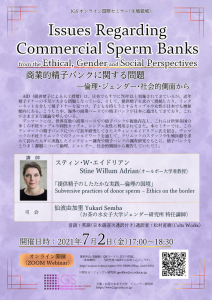International IGS Seminar “Issues Regarding Commercial Sperm Banks from the Ethical, Gender, and Social Perspectives”
Although sperm donation is an ancient reproductive technique, it overturns preconceptions about family, sexuality, race, normality, kinship, and marital relationships, and it has triggered political, ethical, and regulatory controversies across the world. In addition, sperm donation has produced debates such as who has the right to use donated sperm, how sperm donors are classified and screened, how relationships such as kinship and affinity have been systematized, and how health-risk-free donation can be implemented. With the advent of Danish private sperm banks, these debates have become intertwined with the issue of cross-border sperm sales and reproductive tourism.
Danish sperm banks are quite renowned, and they have expanded into the Japanese market in recent years. In Japan, donor insemination cannot be implemented due to a shortage of sperm donors. In this seminar, Dr. Adrian showed the results of two ethnographic fieldworks that she conducted at a Danish sperm bank and a fertility clinic in Denmark 10 years apart. She then briefed about what has been happening regarding the sale and use of donated sperm across the Danish border. She also explained how the Danish sperm banks have gained trust and how normative negotiations have been carried out in the presence of different cultures, laws, and perceptions in each country, leading to the current practices. She then mentioned what normative changes would emerge in the controversies regarding donated sperm and reproductive tourism.

First, Dr. Adrian presented the history of Danish sperm banks. The Central Sperm Bank Foundation (called Fonden) was established in Denmark in 1976, and it used to distribute sperm throughout the country. In the 1970s, infertility treatments were performed only at public reproductive medical institutions in Denmark. At that time, most clients were heterosexual couples, and sperm donors were anonymous. Recipient couples were recommended to not tell anybody including their children that they had used donated sperm to have children. However, after the first Danish IVF baby was born in 1982, infertility treatments began at private fertility clinics, and commercial sperm banks were born. Furthermore, the need for commercial sperm banks had increased because private fertility clinics began providing donor insemination to same-sex couples and single women. Meanwhile, the desire of sperm donation by non-anonymous donors among lesbian and single clients had emerged in Denmark.
Furthermore, with the development of sperm freezing technology and transportation technologies, these commercial sperm banks expanded not only within the Denmark but also to other countries. In cross-border sperm commercial transactions, sperm banks are required to adapt to the laws and regulations of not only Denmark but also the European Union (EU) and other countries. Furthermore, they are expected to respect the ethical aspects of each country, and various norms are required to be reconstructed. Dr. Adrian also mentioned about discrimination regarding usage of reproductive technology by same-sex couples and single women, as well as examples of political debates about “do it yourself” sperm (sperm self-injection) in Europe. She concluded that analyzing how subversive practices of sperm banking and donation have unfolded is quite revealing in terms of the contingencies and complexities of the ways in which different norms emerge. Furthermore, the normative negotiations and subversive practices have concrete consequences. Lastly, she mentioned that reproductive technologies would give us an idea as to how we can change the future into a brighter and less discriminatory world.
After the lecture, we received more than 30 questions and comments from the participants. We extended the seminar by about 15 minutes, and Dr. Adrian addressed some of the queries. We noted that people are quite interested in this issue.
Reported by SEMBA Yukari
(Project lecturer, IGS, Ochanomizu University)
|
《Event Details》 【Date/Time】July 2, 2021, 17:00–18:30 (JST)/10:00~11:30 (CET) |


